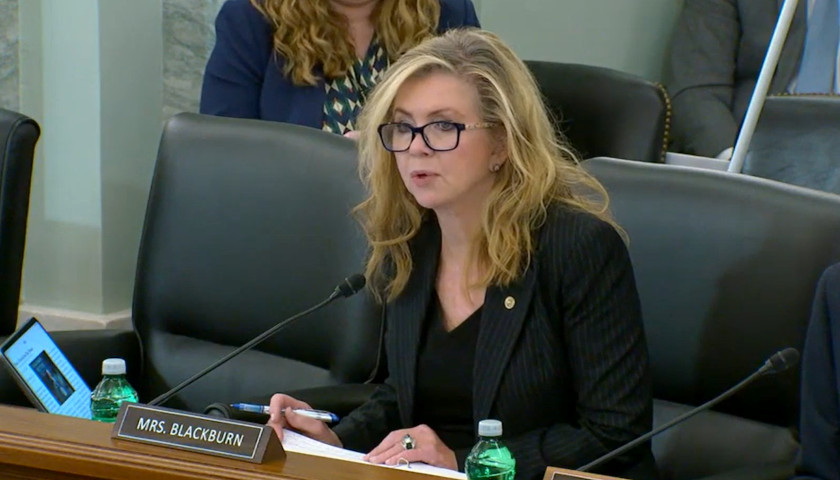Tennessee Sen. Marsha Blackburn (R) and Connecticut Sen. Richard Blumenthal (D) led a bipartisan grilling of Facebook’s Antigone Davis Thursday about apparent troubles the company’s photo-sharing platform causes for teenagers.
Davis, Facebook’s global head of safety, testified before the Senate Commerce, Science, and Transportation Subcommittee on Consumer Protection, Product Safety and Data Security, of which Blumenthal and Blackburn are respectively chair and ranking member. The meeting focused largely on the psychological hazards that Facebook has quietly acknowledged its photo-album application Instagram has posed to children and teens.
In September, Blumenthal said, a whistleblower spoke with his office about internal Facebook documents which would become the subject of a major report by The Wall Street Journal. The material revealed that research commissioned by the company found Instagram exacerbated teenagers’ insecurity about appearance and thoughts of suicide. Those findings ran counter to Facebook Chief Executive Officer Mark Zuckerberg’s earlier statement to Blumenthal and Blackburn that his company was “not aware” of evidence that many youths are experiencing such harms due to Instagram overuse.
Blackburn said that Facebook has not only failed to adequately safeguard kids and teens from these problems but that it has performed market research on children as young as eight, which is five years younger than the official minimum age one must reach to use either Facebook or Instagram. She said the social network has attempted to use roundabout methods of recruiting underage kids to its sites; she noted, for instance, the corporation has considered creating a version of Instagram specifically for those too young to use the main platform. Blackburn also alleged that Facebook has underhandedly urged some kids to violate the sites’ rules to gain access.
“Facebook is fully aware that underage children are using their [sic] platforms,” the senator said. “Not only that, but they encourage older teen siblings to recruit their younger siblings and are actually devising marketing plans to help kids and teens—get this—create secondary or anonymous accounts that they can hide from their parents.”
Davis utterly denied both the senators’ characterization of Facebook’s behavior and The Journal’s narrative regarding the company’s own studies of young people. She pointed out that, despite some surveys showing many teenagers suffered negative mental-health consequences as a result of Instagram use, one research document indicated most teen girls and boys said connections fostered through Instagram actually assuaged personal troubles like loneliness, sadness, anxiety and eating disorders.
“I want to be clear,” she said. “I’m not diminishing the importance of these issues or suggesting that we will ever be satisfied if anyone is struggling on our apps. That’s why we conduct this research: to make our platform better; to minimize the bad and maximize the good; and to proactively identify where we can improve.”
On the subject of a photo-sharing app targeted to children, Davis said such a site would only exist with parental-guidance measures in place. She said the project has been paused to ensure proper care is taken with it.
One particularly tense exchange between Davis and Blackburn concerned the latter’s insistence, also based on The Journal reporting on internal company communications, that Facebook had failed to act decisively against traffickers recruiting women into domestic servitude.
“Ms. Davis, did Facebook know about content on its platform used to recruit women into forced slavery and why did you not remove it until Apple threatened to drop Facebook from the App Store?” the senator asked.
“Respectfully, senator, I don’t agree with that characterization of what occurred,” Davis replied. “In fact, we have policies against sex trafficking on our platform.”
“This is your reporting!” Blackburn fired back. “Ms. Davis, this is your company’s reporting. You knew this was there. You knew it was there! But you didn’t do anything about it! Is it still there? Are you still allowing sex trafficking on Facebook? Is this something that girls as young as eight who are on your site are exposed to?”
Davis did not answer before Blackburn quickly proceeded to other questions.
Thursday’s hearing was the third in a series the subcommittee has been holding to inform the crafting of legislation to address the deleterious impacts of social media use on young people. Blumenthal said that while attention has focused most heavily on Facebook and Instagram so far, his panel is broadly concerned with the effects of social media and thus anticipates questioning officials of other corporations in that industry.
– – –
Bradley Vasoli is a reporter at The Tennessee Star and The Star News Network. Follow Brad on Twitter at @BVasoli. Email tips to [email protected].








